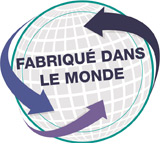Réexaminer le commerce dans le contexte de la mondialisation — Les chaînes de valeur mondiales et leurs conséquences
Un atelier international sur le thème “Réexaminer le commerce dans le contexte de la mondialisation” s'est tenu à Chengdu, en Chine, en octobre 2011. Après les allocutions des principaux intervenants, l'atelier a porté sur l'analyse des chaînes de valeur mondiales dans le cas de la Chine. Cette analyse a été suivie par un exposé sur la façon dont le commerce peut être “mesuré” en valeur ajoutée afin que les responsables de l'élaboration des politiques et les analystes commerciaux disposent de meilleures statistiques. L'atelier s'est terminé par une analyse des conséquences pour la politique commerciale et l'emploi.
(uniquement en anglais)
Background
Asia has developed into a manufacturing hub — often referred to as “Factory Asia”. Today, some 80 per cent of Asia’s exports are manufacturing products, e.g. electronics. Global value chains contributed to this development. Nowadays, a large part of manufactured products consumed all over the world is produced within international supply chains. Companies specialize in specific tasks (trade in tasks) and more and more products are composed of parts and components of various geographical origins. The label on the back of such products should be “Made in the World” rather than “Made in a specific country”.
October 2011
Session One |
|||
15.00 -15.05 |
Opening of the Seminar |
||
| 15.05 -15.20 | Keynote Speech > Speech |
||
15.20 -15.35 |
Remarks |
||
15.35 -15.50 |
Remarks |
||
| Session Two | Global Value Chains — the Asian Experience, Measurement, and Impact on Employment and Income |
||
| 16.00 -16.20 | “What is behind ‘Made in China’?” Evidence from China's Processing Trade Regime |
||
| 16.20 -16.40 | Trade in Value Added — Methodologies and Experiences |
||
| 16.40 -17.00 | Global Value Chains — Implications for Trade Policy and Employment |
||
| Session Three | Forum Discussion and Q&A |
||
| 17.15 -18.00 | Moderator: Mr Patrick Low |
||
| 18.00 | Conclusions |
||
